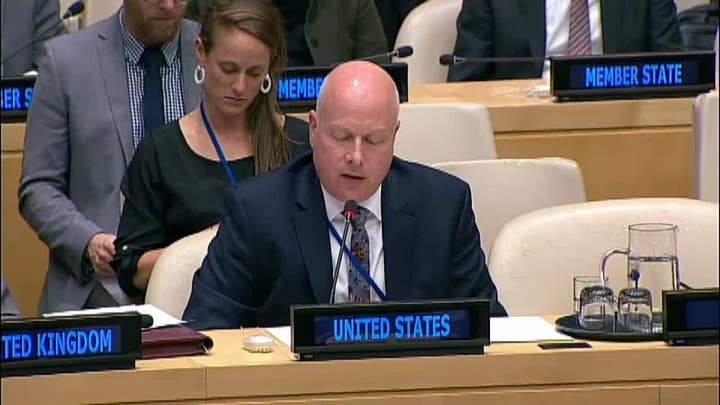China, Iran and Saudi deal helps Beijing at US expense: Gordon Chang
Gatestone Institute Senior Fellow Gordon Chang says the U.S. takes a back seat in the Middle East.
JERUSALEM, Israel — Sen. Joni Ernst, R-Iowa, decried President Biden's Middle East policies for picking fights with U.S. allies and failing to build on the Trump administration’s "incredible breakthrough" in securing diplomatic normalization between Israel and Sunni Muslim countries in the Gulf and North Africa.
"As a co-chair of the Senate Abraham Accords Caucus, I am committed to the continued strengthening and expansion of the Abraham Accords, which will bring further peace and prosperity to a region threatened by the largest state sponsor of terrorism, Iran. President Biden has failed to build on President Trump’s incredible breakthrough," Ernst told Fox News Digital.
"Instead, the Biden administration is alienating our partners, including Saudi Arabia. Further cooperation in the region will require U.S. leadership and an administration that is committed to working with our friends to counter Iran’s malign influence, not one which labels them a ‘pariah.’"
Biden pledged during his campaign to treat Saudi Arabia as a "pariah" state because the kingdom, according to the CIA, carried out the assassination of Saudi columnist Jamal Khashoggi.
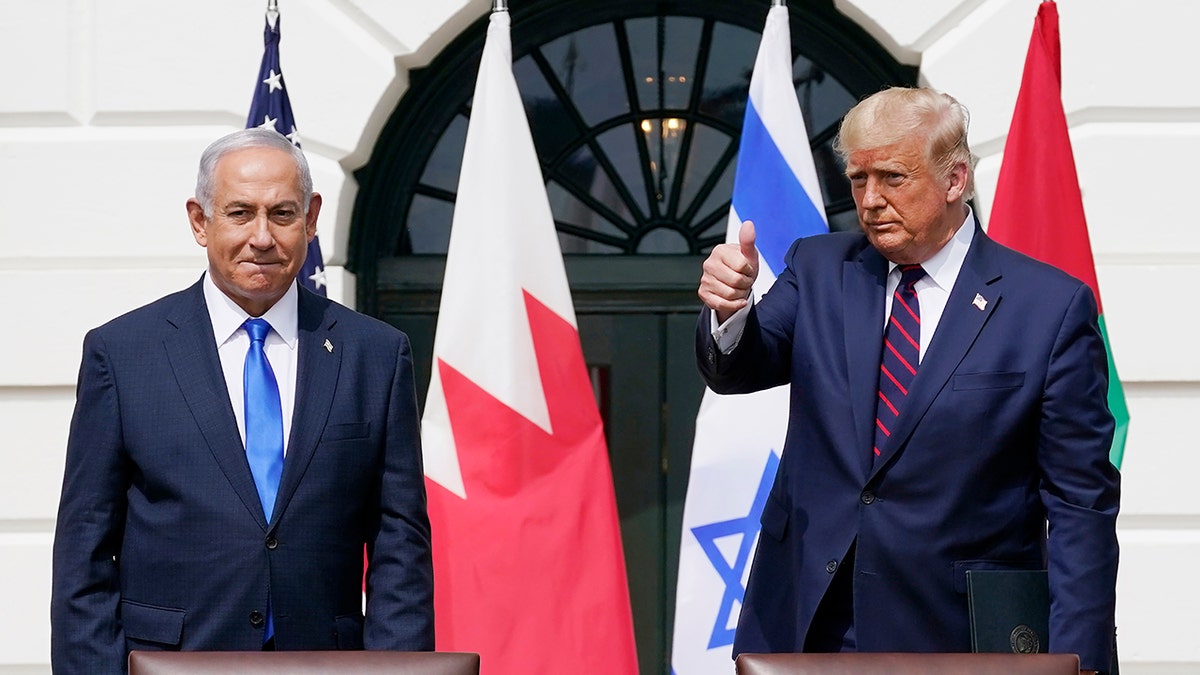
President Trump and Israeli Prime Minister Benjamin Netanyahu attend the Abraham Accords signing ceremony on the South Lawn of the White House in Washington, Sept. 15, 2020. (AP Photo/Alex Brandon, File)
After the completion of the Abraham Accords, which normalized diplomatic relations between Israel and the United Arab Emirates, Bahrain, Morocco and Sudan in 2020, there was a growing expectation among U.S. officials and Mideast experts that Saudi Arabia would follow suit.
The Abraham Accords are widely considered the most important Mideast diplomatic peace achievement of this century.
As a result of Biden giving Saudi Arabia the cold shoulder, the kingdom has shifted its weight toward Iran’s regime by reestablishing diplomatic relations with Tehran, veteran Mideast experts argue.
Ernst has zoomed in on the dangers posed by the Islamic Republic of Iran, the world’s most threatening state-sponsor of terrorism, according to the U.S. State Department.
A member of the Senate Armed Services committee, Ernst introduced the Maritime Act to build on the Abraham Accords by requiring the Department of Defense to formulate a strategy with allies in the Middle East to counter Iranian regime maritime threats.
Ernst also spearheaded the DEFEND Act to combat attacks from Iranian-backed extremists through air and missile defense capabilities.
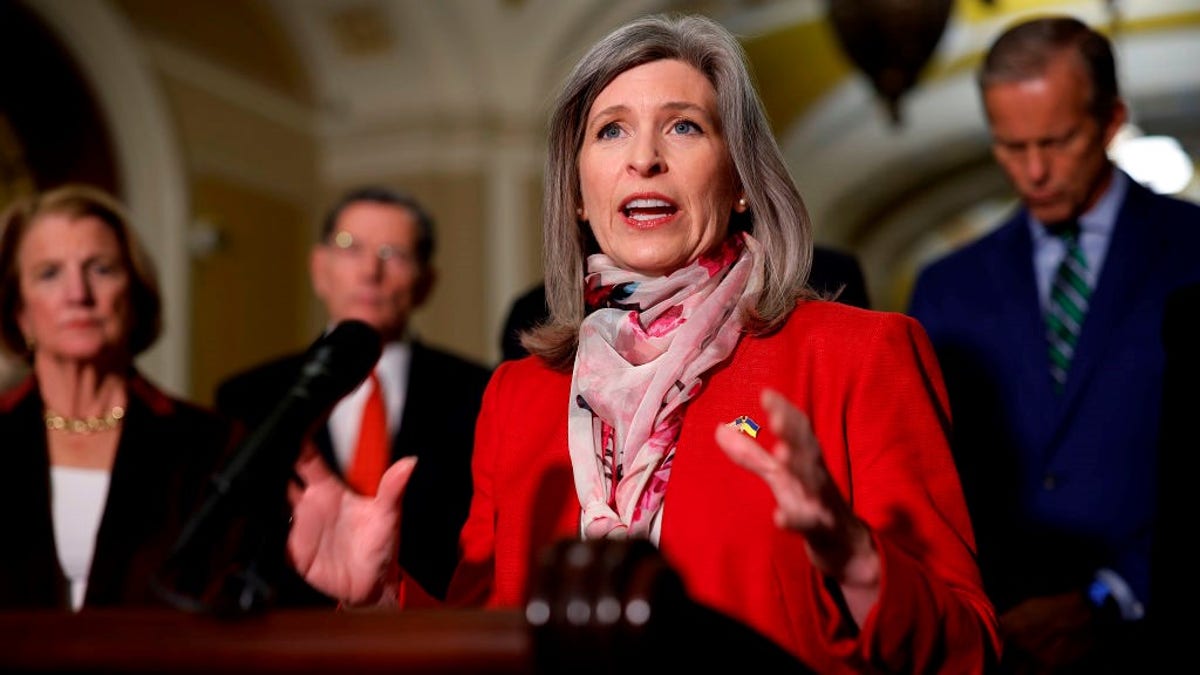
Sen. Joni Ernst, R-Iowa, talks to reporters following the weekly Senate Republican policy luncheon at the U.S. Capitol Feb. 14, 2023, in Washington, D.C. (Chip Somodevilla/Getty Images)
Asked if the Biden administration is failing to uphold and further the Abraham Accords a State Department spokesperson told Fox News Digital that, "The Administration is fully committed to strengthening and expanding the Abraham Accords and supporting Israel’s integration into the Middle East. This will be an area of continued emphasis and focus for us over the coming period as we look to achieve a more integrated, more prosperous, and more stable region that serves the interests of our partners and the United States over the long term."
The spokesperson added "The Biden Administration has unlocked Saudi and Omani airspace for civilian flights to and from Israel and Asia—one step along the road toward what we hope will become a full normalization between Israel and Saudi Arabia. Ultimately, getting to full normalization is a declared national security interest of the United States."

Secretary of State Antony Blinken speaks as his image in seen on a large screen behind him at the J Street National Conference at the Omni Shoreham Hotel in Washington, Sunday, Dec. 4, 2022. (AP Photo/Carolyn Kaster) ( (AP Photo/Carolyn Kaster))
The meeting of Sunni countries with Israel earlier this year was also highlighted as an accomplishment by the State Department spokesperson ,who noted "Senior officials from the United States held two days of productive meetings of the Negev Forum’s six working groups in Abu Dhabi January 9-10, joining representatives from the governments of Bahrain, Egypt, Israel, Morocco, and the United Arab Emirates. "
The spokesperson continued "This was a significant meeting of the six working groups, with around 150 officials representing the different countries of the Negev Forum. This was the largest such gathering of Israeli and Arab government officials since the Madrid process in the 1990s."
IRANIAN MEDIA CLAIMS NAVAL FORCES WARNED US NAVY AIRCRAFT AGAINST ENTERING ITS AIRSPACE
Jason Greenblatt, the former White House envoy to the Middle East during the Trump administration and author of the book "In the Path of Abraham," told Fox News Digital he does not believe the Biden administration "wrecked the accords. They say all the right things. They want to move it forward."
Greenblatt, one of the chief architects of the accords, took the White House to task for creating daylight between America and its long-term ally Saudi Arabia.
"They alienated Saudi Arabia, and that caused Saudi Arabia to move in another direction," he said. "The U.S. turned back on Saudi Arabia and the region. And the U.S. is paying the price. The current administration won’t admit that they dropped the ball."
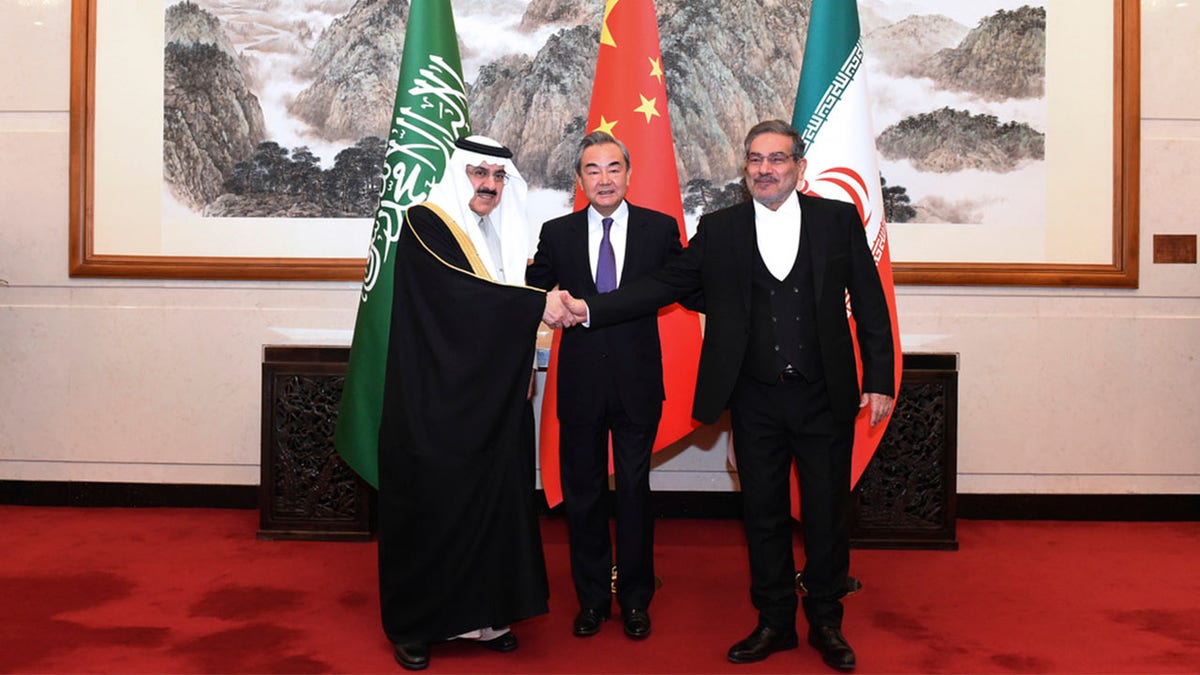
In this photo released by Xinhua News Agency, Ali Shamkhani, secretary of Iran's Supreme National Security Council, at right, shakes hands with Saudi national security adviser Musaad bin Mohammed al-Aiban, left, as Wang Yi, China's most senior diplomat, looks on, at center, for a photo during a closed meeting in Beijing March 11, 2023. (Luo Xiaoguang/Xinhua via AP)
He added that the Biden administration has done a "poor job of standing by our allies UAE and Saudi Arabia. The U.S. administration is just starting to realize it. Greenblatt said Sullivan’s recent visit to Saudi Arabia was a telling example of the Biden administration’s awakening.
"Mere words do not matter. If we do not stand by them when they are attacked or their freighters are attacked, mere words do not mean anything," Greenblatt said of Saudi Arabia and the UAE.
Greenblatt said it is difficult to envision a country signing onto the Abraham Accords at the present time. He recommended that the "focus should be on the long complicated path to get to the end game," citing the example of Riyadh opening its airspace to Israel.
Greenblatt said dramatic changes have unfolded in the countries that are part of the Abraham Accords, citing Bahrain, the UAE and Morocco.
"You feel more welcome as a Jew [in these countries] than in certain countries in Europe," Greenblatt said. "I walk in these countries with a kippa on, and there is no discomfort. There are some European countries where I wear a baseball cap."
Many religious Jews cover their heads with a baseball cap in European countries due to antisemitic violence.
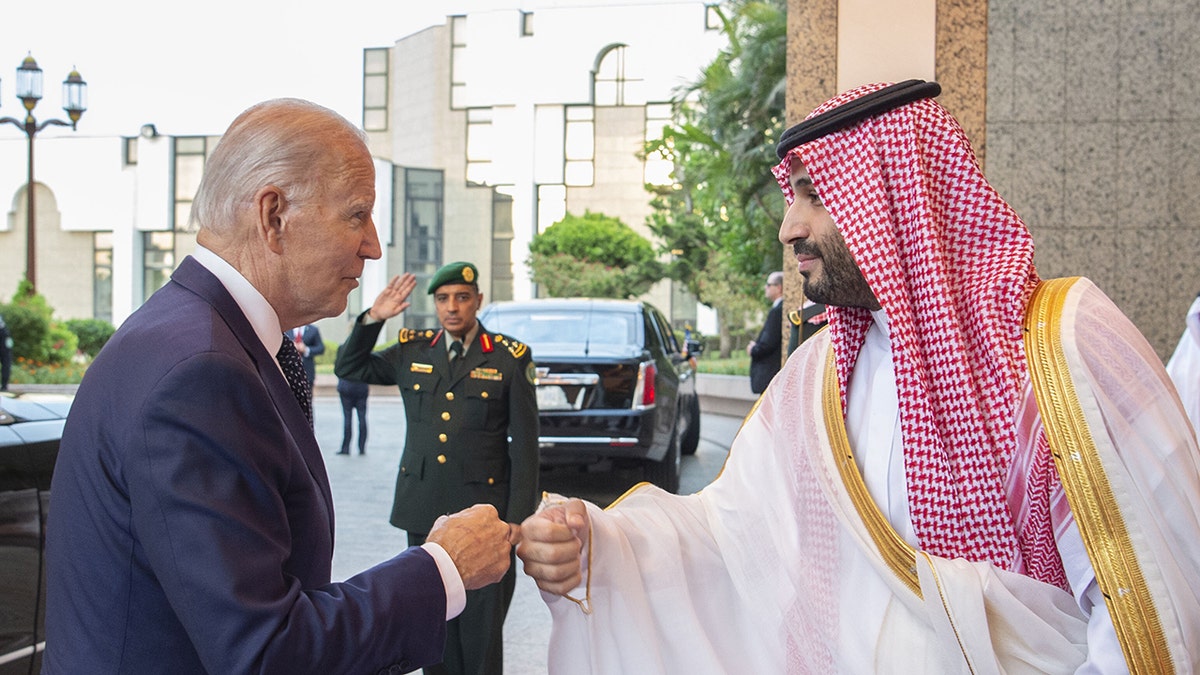
President Biden welcomed by Saudi Arabian Crown Prince Mohammed bin Salman at Alsalam Royal Palace in Jeddah, Saudi Arabia July 15, 2022. (Royal Court of Saudi Arabia/Handout/Anadolu Agency via Getty Images)
The stability of the Abraham Accords is a central pillar of Israel’s foreign policy. Yet the Biden administration’s alleged aloofness in the Mideast is causing distress for the Jewish state. On Sunday it was reported by the Iranian regime news agency Tasnim that Tehran is close to re-establishing ties with Egypt.
Brigadier-General (Reserves) Amir Avivi, founder and chairman of the Israeli Defense Security Forum, told Fox News Digital the "future is stable" for the Abraham Accords.
US LEFT OUT AS CHINA, IRAN COME OUT ON TOP IN LATEST DEAL WITH SAUDI ARABIA: 'SIGN OF THE TIMES'
He said the accords are resilient for "a very simple reason" that the "Gulf states still view Iran as an existential threat. Without clear American leadership in the Middle East, they need to rely more on Israel."
He said the reliance on Israel covers the sectors of technology, intelligence and military and also "in the sense of building strong and relevant economies that are not based on oil and gas."
"There is a clear feeling from the Sunni world that the U.S. has abandoned them," Avivi said. "That they cannot trust America. The crisis started in Obama’s presidency when he supported Iran and the Muslim Brotherhood. Iran and the Muslim Brotherhood pose existential threats to moderate Sunni governments."
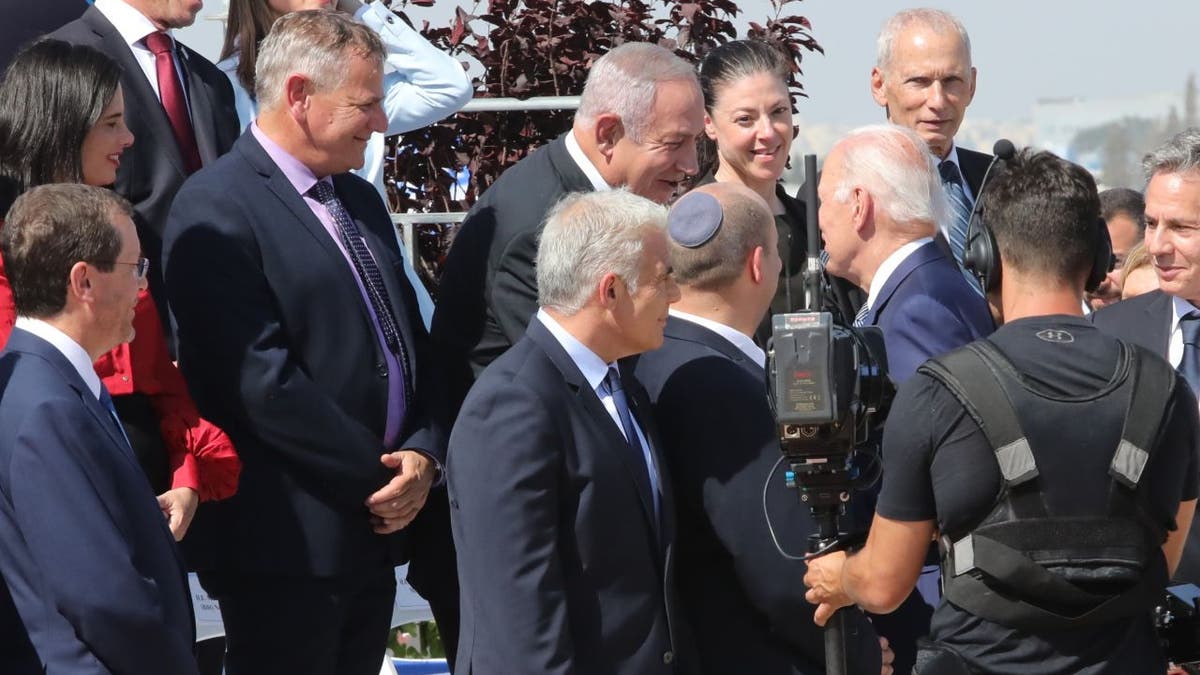
President Biden shakes hands with then former Israeli Prime Minister Bibi Netanyahu despite a White House advisory that the president would avoid handshakes due to COVID-19 concerns. (Gideon Marcowicz/TPS)
With a view toward expanding the Abraham Accords to include Saudi Arabia and others, the Israeli general noted the Kingdom of Saudi Arabia "is the leader of the Sunni world. The Saudis can bring Pakistan and Indonesia to peace agreements. These are important countries.
"Every single Sunni country will follow the Saudis if the Saudis are on board. But the Saudis want America to stand with the Saudis, (and they) will enhance oil production."
Shoshana Bryen, the senior director of the U.S.-based Jewish Policy Center, told Fox News Digital it is, for now, "too big a step for the Saudis" to join the accords.
"The whole thing is dead in the water, at least until the Saudis believe the U.S. will support them," she said.
Bryen said the Trump administration introduced a number of key ideas that helped cement the Abraham Accords, but the Biden administration is reviving counterproductive approaches.
She noted that Trump engaged in "movement away from the Palestinian issue. You can create a broader regional structure. It will help you economically, and it will help you with Iran."
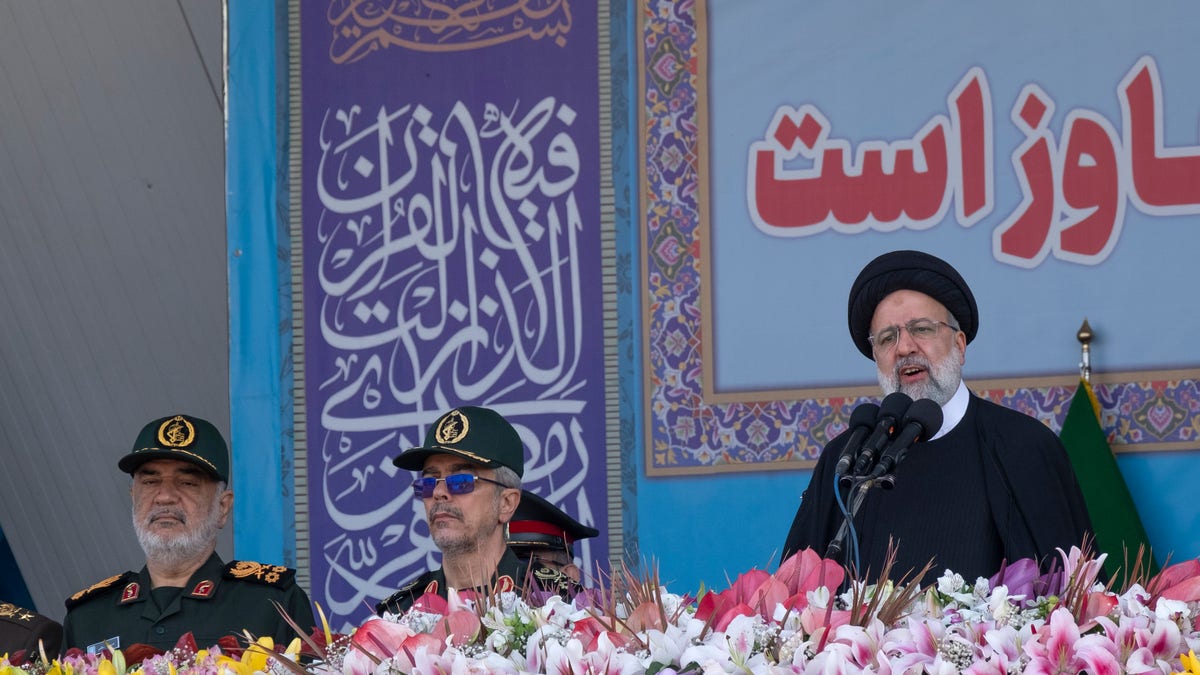
Iranian President Ebrahim Raisi, right, stands next to Hossein Salami, commander-in-chief of the Islamic Revolutionary Guard Corps (IRGC), left, and Mohammad Bagheri, chief of staff for the Armed Forces of the Islamic Republic of Iran, during a military parade marking Iran's Army Day anniversary near the Imam Khomeini shrine in the south of Tehran April 18, 2023. (Morteza Nikoubazl/NurPhoto via Getty Images)
Bryen added the Biden administration is "interested in working with Iran and not opposing it."
In contrast to the Trump administration’s "maximum pressure" campaign to weaken Iran’s theocratic state, Bryen cited examples where the White House is stabilizing the finances of the cash-strapped regime in Tehran. She noted the "White House won’t say anything about Iran selling oil" and "Biden got the South Koreans to pay Iran’s dues at the U.N."
CLICK HERE TO GET THE FOX NEWS APP
She added that Biden waived sanctions on the Iranian regime’s strategic ally, the Houthis, in Yemen. The Houthis, who the Trump administration branded a foreign terrorist organization, invoke a battle cry calling for destruction of America and Israel.

